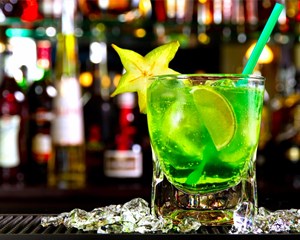Ice is not a monolith. It encompasses everything from the giant iceberg that sank the Titanic – "the most famous piece of ice in the history of the world," as the writer Mariana Gosnell observed – to the millimetre-thin stuff you find at the edges of ponds and puddles, also known as "cat ice" – ice so thin that it could support the weight of a cat, but nothing heavier. Ice is at once a byword for permanence and something whose evanescence is essential to how we use it.
冰不是一塊巨石。它包羅萬象,從令泰坦尼克號沉沒的巨大冰山——正如作家瑪麗安娜·戈斯內爾所說:“它是世界歷史上最著名的一塊冰,”——到可以在池塘、水坑邊兒發現的那種只有幾毫米薄的冰,也叫“貓冰”——冰薄到僅可支撐一只貓的重量,再重些就不行了。冰既是永恒的代名詞,也極易逝去,所以我們如何使用它至關重要。
For something so apparently simple, it can be fiendishly complex. The science of ice is maddening, and features phenomena such as the Mpemba effect, in which hot water appears to freeze faster than cold. Ice is maddening, in fact; anyone selling it for a living fights a constant battle against the laws of thermodynamics and the basic tenets of common sense, filling their freezer in the winter and clearing it out just as the weather starts to get hot. Elizabeth David writes of early importers desperately pleading with port authorities about the amount of duty payable on a cargo that was visibly diminishing in size. Perhaps the most successful ice-man of the 20th century, James Stuart, abandoned his empire for unspecified personal reasons just months after Ian Parker had profiled him in the New Yorker. Even Frederic Tudor, the 19th century Boston Ice King, spent time in prison on several occasions, having been rendered bankrupt by his obsession. With ice, crisis is a constant, a looming threat and fatal flaw inherent to every cube.
一些看似簡單的東西可能實則極為復雜。有關冰的科學令人發狂,它具備姆潘巴效應等特征,即熱水似乎比冷水更易結冰。冰本身就令人發狂,任何以賣冰為生的人都在與熱力學定律和基本常識作斗爭,冬天的時候將冰裝滿冰箱,天氣開始變熱時再將冰清空冰箱。伊麗莎白·大衛寫過早期的進口商如何絕望地懇求港務局對體積明顯縮小的貨物征收的關稅數額。詹姆斯·斯圖爾特大概是20世紀最成功的冰人,他在伊恩·帕克在《紐約客》上對他進行專訪的幾個月后便因不明個人原因放棄了自己的商業帝國。就連19世紀波士頓的“冰之王”弗雷德里克都鐸也曾多次入獄,因太過執迷而破產。對于冰來說,危機是一個永恒的、即將面臨的威脅,也是每個立方體都固有的致命缺陷。

So now Brexit looms – bad news for a business that exports products to the continent in temperature-controlled lorries – and Covid-19 drags on. The usual, virtual attempts have been made to keep morale high at The Ice Co during the pandemic – Friday afternoons see the doors open to The Ice-Olation Station, an online pub – but the apocalyptic subtext of the EPIA's newsletter from March this year – which promised "the certainty of a significant decline in packaged ice sales for this coming peak ice sales season" – was unignorable. Now the packaged ice industry faces a Christmas period that will feature fewer parties and, one can safely assume, less Party Ice.
因此,現在英國脫歐迫在眉睫——對于一家用溫控卡車向歐洲大陸出口產品的企業來說,這是個壞消息——2019冠狀病毒病還在蔓延。疫情期間為了保留士氣,The Ice Co和其它企業一樣也采取了一些線上措施——周五下午人們會看到一家名為Ice-Olation Station的在線酒吧——但今年三月EPIA(歐洲光伏行業協會)通訊中的末日潛臺詞——預示“在即將到來的冰銷售旺季,包裝冰的銷量肯定會大幅下降”——不容忽視。如今,包裝冰行業正面臨著一個派對減少的圣誕季,“派對冰”的需求勢必也將減少。
But it is further in the future that ice's real reckoning awaits. The Ice Co's management team talked in rapturous tones about the long, hot summer of 2018: the year the ice almost ran out, when a full lorry was dispatched from the factory every 30 minutes, round the clock, for weeks on end. And yet selling ice in a world that's demonstrably heating up presents both an opportunity and an ethical dilemma. From the hack-it-off-a-glacier days up to the present, ice has always been about mankind's relationship with the environment. Even if the industry is no longer so obviously extractive, it still leaves a sizeable carbon footprint.
不過,冰塊真正的清算還要等到更久遠的未來。The Ice Co的管理團隊興高采烈地談論著2018年漫長炎熱的夏天:那一年,每30分鐘就有一輛滿載的卡車從工廠運出,連續幾周不停歇,冰塊幾乎售空。然而,在一個氣溫顯然正在升高的世界里賣冰既是機遇,也面臨著道德難題。從冰川崩解到現在,冰一直與人類和環境的關系問題息息相關。即便該行業的采掘性不再那么明顯,但仍會留下相當大的碳足跡。











